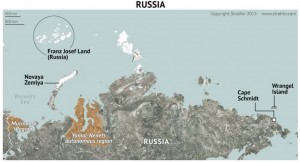Russia’s Perception of the Arctic
Russia appears to be gearing up for any eventuality in the Arctic, but its policy-makers are beginning to debate whether Russian pressure in the Arctic serves as a geopolitical pivot that could alter the regional balance of power. The emergence of a dominant Arctic player will certainly affect trans-Atlantic trade routes and commitments, relations between Russia and the northern European countries and relations between Russia and China. For half a century, the Arctic was an area of U.S.-Soviet friction and the site of numerous incidents that could easily have led to conflict. Even in a post-Cold War world, the region could once again be transformed into a zone of frozen conflicts. The great powers have long competed over the Arctic, and now countries such as China and India are expressing their own interest in the region.
 Although Russia faces a raft of internal and external problems such as a strained economy, matters in Ukraine and pressure from the international community, the Kremlin remains wedded to its pursuit of the Arctic. This has forced Russia’s neighbors to reassess their own military presence in places like the Barents Sea, as well as territorial claims to disputed parts of the Arctic Circle. Norway will press harder for a larger NATO presence in the northern region, but while military conflict remains a threat, Russia will stop short of instigating hostilities. The Kremlin knows that when it comes to acquisitions, actions speak louder than words, and any attempt to grab the rich, unclaimed territory of the Arctic Circle will have to be backed by force.
Although Russia faces a raft of internal and external problems such as a strained economy, matters in Ukraine and pressure from the international community, the Kremlin remains wedded to its pursuit of the Arctic. This has forced Russia’s neighbors to reassess their own military presence in places like the Barents Sea, as well as territorial claims to disputed parts of the Arctic Circle. Norway will press harder for a larger NATO presence in the northern region, but while military conflict remains a threat, Russia will stop short of instigating hostilities. The Kremlin knows that when it comes to acquisitions, actions speak louder than words, and any attempt to grab the rich, unclaimed territory of the Arctic Circle will have to be backed by force.
“Russia’s Plans for Arctic Supremacy is republished with permission of Stratfor.”
